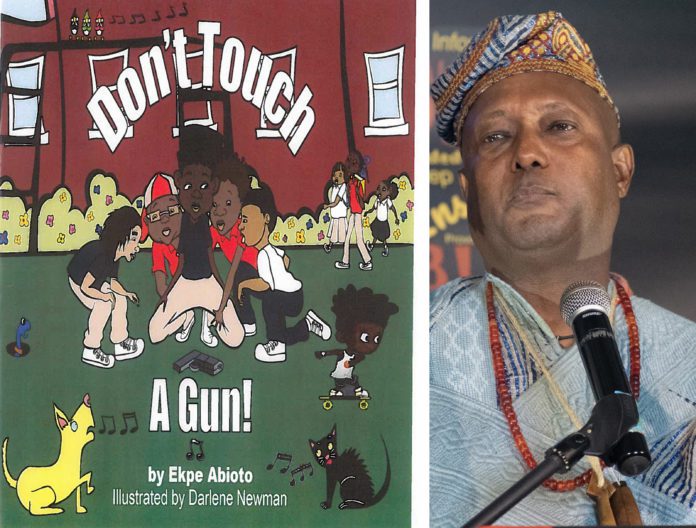A popular Memphis figure in children’s motivational workshops has dropped a colorful and creative book with an important message: “Don’t Touch A Gun.”
Ekpe Abioto, a self-styled “musical philanthropist” has been drumming and chanting positive messages to children for nearly five decades. Abioto’s new book reinforces the message on his interactive music video of the same title.
Abioto talked recently with The New Tri-State Defender about his new release.
While the book is new, it grows out of Abioto’s workshop presentations for more than two decades.
“Well, I first wrote the song, ‘Don’t Touch A Gun,’ in 1997,” said Abioto. “I already had the performances that I do for children — “I Am A Genius and Buckle In,” which is a seatbelt safety song…”
A Head Start interim director suggested to Abioto that a song should be written for children about never touching a gun. Two months later, “Don’t Touch A Gun” was performed for young children in Abioto’s workshop.
Twenty-five years later, the book heralds the same message.
Bold, colorful illustrations contain the whimsical use of movement and abstract to pull young readers into the book.
Memphis artist, Darlene Newman, collaborated with Abioto to bring his vision to fruition.
“I was delighted to work on this children’s book,” said Newman. “I align myself with projects that align with my beliefs, stories which are positive and teach a valuable lesson. As you can see, the use of color is a dominant element. I often end up being surprised with the finished product.”
Abioto appreciates Newman’s talent, which brings the message of the book to life, he said.

“I probably went through five or six artists,” said Abioto. “Certain things just didn’t quite work out. There were just so many things when you’re working on something like that. Everything has to really come together.”
Newman said she was pleased with how the copy and the illustrations were coordinated.
“Ekpe had a lot of input with the illustrations,” said Newman. “It was important for the visuals to be pretty, pleasing to the eye. The great collaboration produced a wonderful children’s book.”
On the cover, an intriguing scene confronts the reader, even before opening the book. There is a gun lying on the ground, and several boys are standing around it.
A black cat is on high alert with its fur sticking up. There is even a young skateboarder, which pays homage to Tyre Nichols, Abioto said.
(Nichols was fatally bludgeoned by Memphis police officers Jan. 7. He died Jan. 10. Six officers were fired because of the encounter; five have been charged with a series of related felonies, including second-degree murder.)
“The whole idea (of the book) is that the boys there find this gun…and they are trying to figure out what they are going to do,” said Abioto. “So…you read through the book and find out how all of this develops and what happens as a result of them finding the gun. You always want to use a catchy cover to try and get peoples’ attention.”
Flip the book over and it reads, “Don’t Touch A Gun.” No matter how you look at it, the message comes through loud and clear.
Abioto laments that the message of the book is as timely as it ever was, nearly three decades after the concept was encapsulated in a song.
“Unfortunately, the message of my book is still relevant, and it seems to be getting worse,” said Abioto. “Not just more guns on the streets, but in the homes…and some parents are more vigilant than others about not having guns where children can get to them.”
Abioto expressed regret that Memphis has a problem with children gaining access to guns and hurting themselves or someone else.
“…Last year, 35 children were killed by guns in Memphis,” said Abioto. “And from what I read, a couple of hundred more were injured by guns. This is tragic, and we must be concerned about the problem.”
Abioto’s organization, GENIUS UNLIMITED, specializes in children’s musical and cultural entertainment and promotes such principles as high self-esteem, creative thinking, conflict resolution, drug prevention, and gang awareness in a format he calls “motivational learning.”
Abioto, more widely known as “Ekpe,” plays African instruments as his signature presentation, including the djimbe drum and the kalimba, or thumb piano.
Ekpe, he said, means rock or stone, conveying solid.
“Even though I’m strong and I believe in what I do, there’s this side of me, this balance, this harmonious side … to understand that we want to use the cultural arts.… You … can use that as a way to get to people’s hearts and heads.”
Abioto means born special and divine.
“I’m the last child born in my family. I’m the 14th child … seven girls and seven boys, and I’m number seven.”
(This story includes an interview by Karanja A. Ajanaku. Copies of the book are available by contacting Ekpe Abioto at 901-237-8359.)



